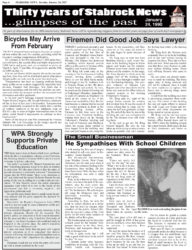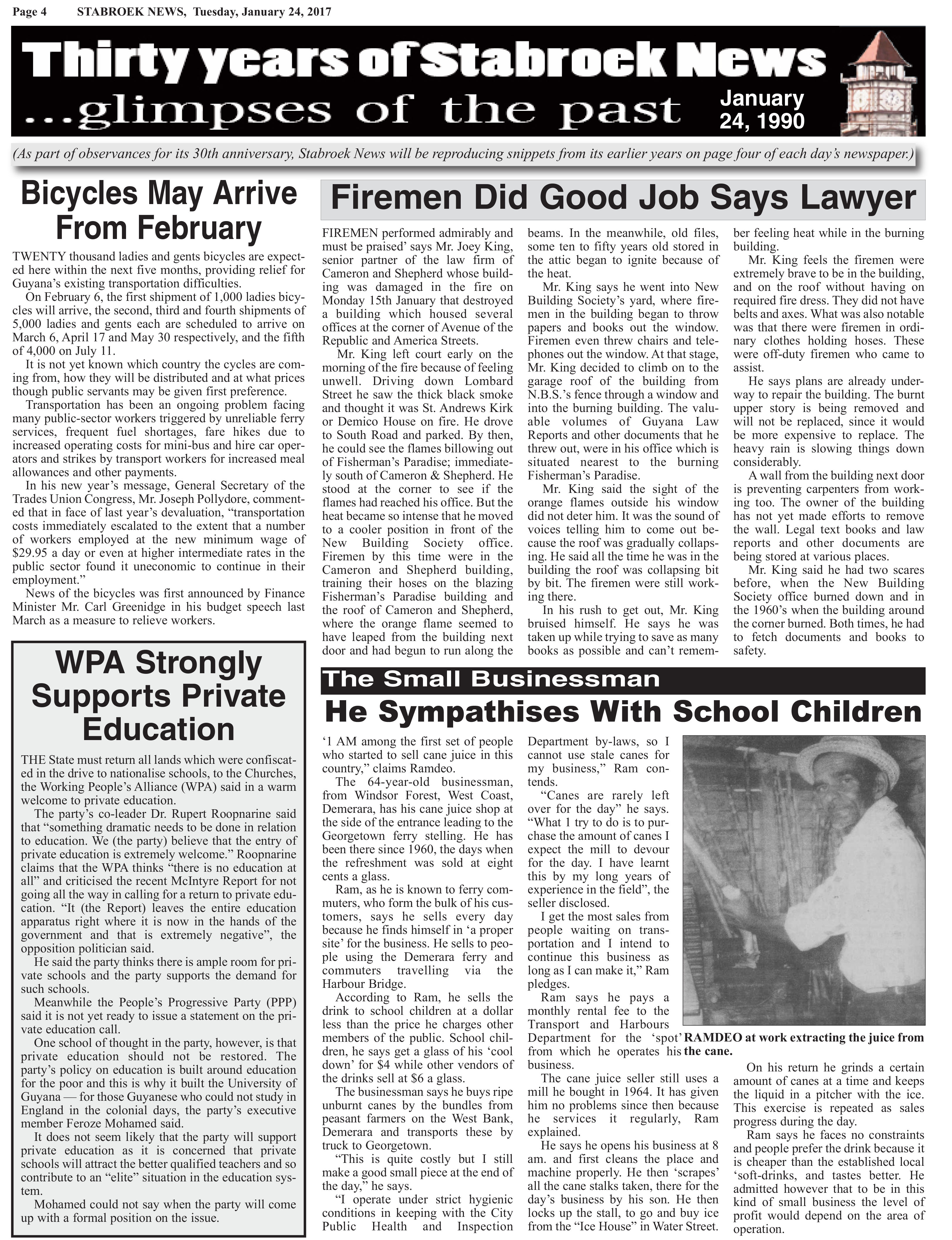Bicycles May Arrive From February
TWENTY thousand ladies and gents bicycles are expected here within the next five months, providing relief for Guyana’s existing transportation difficulties.
On February 6, the first shipment of 1,000 ladies bicycles will arrive, the second, third and fourth shipments of 5,000 ladies and gents each are scheduled to arrive on March 6, April 17 and May 30 respectively, and the fifth of 4,000 on July 11.
It is not yet known which country the cycles are coming from, how they will be distributed and at what prices though public servants may be given first preference.
Transportation has been an ongoing problem facing many public-sector workers triggered by unreliable ferry services, frequent fuel shortages, fare hikes due to increased operating costs for mini-bus and hire car operators and strikes by transport workers for increased meal allowances and other payments.
In his new year’s message, General Secretary of the Trades Union Congress, Mr. Joseph Pollydore, commented that in face of last year’s devaluation, “transportation costs immediately escalated to the extent that a number of workers employed at the new minimum wage of $29.95 a day or even at higher intermediate rates in the public sector found it uneconomic to continue in their employment.”
News of the bicycles was first announced by Finance Minister Mr. Carl Greenidge in his budget speech last March as a measure to relieve workers.
 WPA Strongly Supports Private Education
WPA Strongly Supports Private Education
THE State must return all lands which were confiscated in the drive to nationalise schools, to the Churches, the Working People’s Alliance (WPA) said in a warm welcome to private education.
The party’s co-leader Dr. Rupert Roopnarine said that “something dramatic needs to be done in relation to education. We (the party) believe that the entry of private education is extremely welcome.” Roopnarine claims that the WPA thinks “there is no education at all” and criticised the recent McIntyre Report for not going all the way in calling for a return to private education. “It (the Report) leaves the entire education apparatus right where it is now in the hands of the government and that is extremely negative”, the opposition politician said.
He said the party thinks there is ample room for private schools and the party supports the demand for such schools.
Meanwhile the People’s Progressive Party (PPP) said it is not yet ready to issue a statement on the private education call.
One school of thought in the party, however, is that private education should not be restored. The
party’s policy on education is built around education for the poor and this is why it built the University of Guyana — for those Guyanese who could not study in England in the colonial days, the party’s executive member Feroze Mohamed said.
It does not seem likely that the party will support private education as it is concerned that private
schools will attract the better qualified teachers and so contribute to an “elite” situation in the education system.
Mohamed could not say when the party will come up with a formal position on the issue.
Firemen Did Good Job Says Lawyer
FIREMEN performed admirably and must be praised’ says Mr. Joey King, senior partner of the law firm of Cameron and Shepherd whose building was damaged in the fire on Monday 15th January that destroyed a building which housed several offices at the corner of Avenue of the Republic and America Streets.
Mr. King left court early on the morning of the fire because of feeling unwell. Driving down Lombard Street he saw the thick black smoke and thought it was St. Andrews Kirk or Demico House on fire. He drove to South Road and parked. By then, he could see the flames billowing out of Fisherman’s Paradise; immediately south of Cameron & Shepherd. He stood at the corner to see if the flames had reached his office. But the heat became so intense that he moved to a cooler position in front of the New Building Society office. Firemen by this time were in the Cameron and Shepherd building, training their hoses on the blazing Fisherman’s Paradise building and the roof of Cameron and Shepherd, where the orange flame seemed to have leaped from the building next door and had begun to run along the beams. In the meanwhile, old files, some ten to fifty years old stored in the attic began to ignite because of the heat.
Mr. King says he went into New Building Society’s yard, where firemen in the building began to throw papers and books out the window. Firemen even threw chairs and telephones out the window. At that stage, Mr. King decided to climb on to the garage roof of the building from N.B.S.’s fence through a window and into the burning building. The valuable volumes of Guyana Law Reports and other documents that he threw out, were in his office which is situated nearest to the burning Fisherman’s Paradise.
Mr. King said the sight of the orange flames outside his window did not deter him. It was the sound of voices telling him to come out because the roof was gradually collapsing. He said all the time he was in the building the roof was collapsing bit by bit. The firemen were still working there.
In his rush to get out, Mr. King bruised himself. He says he was taken up while trying to save as many books as possible and can’t remember feeling heat while in the burning building.
Mr. King feels the firemen were extremely brave to be in the building, and on the roof without having on required fire dress. They did not have belts and axes. What was also notable was that there were firemen in ordinary clothes holding hoses. These were off-duty firemen who came to assist.
He says plans are already underway to repair the building. The burnt upper story is being removed and will not be replaced, since it would be more expensive to replace. The heavy rain is slowing things down considerably.
A wall from the building next door is preventing carpenters from working too. The owner of the building has not yet made efforts to remove the wall. Legal text books and law reports and other documents are being stored at various places.
Mr. King said he had two scares before, when the New Building Society office burned down and in the 1960’s when the building around the corner burned. Both times, he had to fetch documents and books to safety.
The Small Businessman
He Sympathises With School Children
‘1 AM among the first set of people who started to sell cane juice in this country,” claims Ramdeo.
The 64-year-old businessman, from Windsor Forest, West Coast, Demerara, has his cane juice shop at the side of the entrance leading to the Georgetown ferry stelling. He has been there since 1960, the days when the refreshment was sold at eight cents a glass.
Ram, as he is known to ferry commuters, who form the bulk of his customers, says he sells every day because he finds himself in ‘a proper site’ for the business. He sells to people using the Demerara ferry and commuters travelling via the Harbour Bridge.
According to Ram, he sells the drink to school children at a dollar less than the price he charges other members of the public. School children, he says get a glass of his ‘cool down’ for $4 while other vendors of the drinks sell at $6 a glass.
The businessman says he buys ripe unburnt canes by the bundles from peasant farmers on the West Bank, Demerara and transports these by truck to Georgetown.
“This is quite costly but I still make a good small piece at the end of the day,” he says.
“I operate under strict hygienic conditions in keeping with the City Public Health and Inspection Department by-laws, so I cannot use stale canes for my business,” Ram contends.
“Canes are rarely left over for the day” he says. “What 1 try to do is to purchase the amount of canes I expect the mill to devour for the day. I have learnt this by my long years of experience in the field”, the seller disclosed.
I get the most sales from people waiting on transportation and I intend to continue this business as long as I can make it,” Ram pledges.
Ram says he pays a monthly rental fee to the Transport and Harbours Department for the ‘spot’ from which he operates his business.
The cane juice seller still uses a mill he bought in 1964. It has given him no problems since then because he services it regularly, Ram explained.
He says he opens his business at 8 am. and first cleans the place and machine properly. He then ‘scrapes’ all the cane stalks taken, there for the day’s business by his son. He then locks up the stall, to go and buy ice from the “Ice House” in Water Street.
On his return he grinds a certain amount of canes at a time and keeps the liquid in a pitcher with the ice. This exercise is repeated as sales progress during the day.
Ram says he faces no constraints and people prefer the drink because it is cheaper than the established local ‘soft-drinks, and tastes better. He admitted however that to be in this kind of small business the level of profit would depend on the area of operation.

